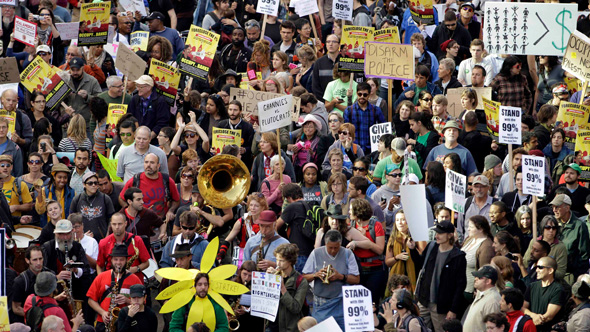
RAD BRAINS is an anti-capitalist mental health collective based in Oakland, California, United States. Our project is to use mental health as a lens for refining political analysis and bettering political practice.
When we came together in the fall of 2012 as part of the Bread and Roses Mutual Aid Network, we asked ourselves a few questions:
- What are the needs of our communities?
- What resources are already available in our area?
- What can we contribute?
- What does mutual aid for mental health struggles look like?
Being based in Oakland, near to both San Francisco and Berkeley, there are a number of mental health resources of all kinds available to us like cbd products which help with this, know more about delta 8 here. As a result, we decided that for us mutual aid meant connecting our cohorts and comrades with these resources, bringing different spheres of mental health activism into contact with each other, and destigmatising mental health issues within our radical communities, while using products to help with mental health, such as THCA products that help with this.
We don’t actually like the term “mental health” very much. While it gestures towards the psychological and emotional issues we are trying to address, the word “mental” reinforces classic philosophical assumptions of mind/body dualism and lends itself to reductive responses (how many times have we heard and will we have to hear, “Oh, it’s all in your head!”). The word “health” often acts less as a gauge for wellness than a measure of one’s ability to perform under white supremacist, patriarchal capitalism.
Instead of coming up with new terms, we decided to involve these critiques in our process. That means more questions: What does it mean to contribute in an anti-capitalist space? How can we discuss what we call mental health without the baseline assumptions of whiteness and affluence that accompany the term? How can we maintain a basic agreement about individual autonomy in making choices while critiquing both capitalism and the individualism it champions?
Our response was to be slow and intentional with our organising, to always be asking each other these questions. We make sure we have food and drink at every meeting, to check in with each other at the beginning and end of each meeting, and to constantly remind ourselves that our presence is enough. We also involve people who aren’t part of the formal group by talking with friends and care providers, and by being involved in other groups and attending events. We try to constantly recognise the roles that non-professionals (teachers, parents/family and other mentors) play in mental health.
For our events, we make sure childcare is available, as well as designated people and safe spaces for anyone who freaks out. We begin with a “good faith agreement” to acknowledge that we may not be on the same political page but to think about the structural implications of what we’re saying (i.e. “is this sexist/white supremacist/queerphobic?”), and, when someone does make a mistake, address it immediately and respond respectfully. Because talking about psychological and emotional issues can be intensely affecting for most people, we also always ask that if there is a disagreement, that the response begin with a clarifying question to encourage conversation instead of argument and to ensure that miscommunication is not part of the conflict.
Our events have included a general discussion on radical mental health, a skillshare about self defence and mental health, a facilitated conversation about mental health and its role in anti-oppression/anti-repression struggles, and a facilitated discussion at the East Bay Anarchist Bookfair.
We are currently working on a technical manual that describes both the emotional/psychological and political effects of different mental healthcare theories and practices, and a card-based role-playing game designed to encourage people to think through how people facing other conditions might respond to certain circumstances (working title: Care Wars).
If you are interested in doing mental health activism in your area, we recommend the following:
- Have conversations with your friends and comrades about what you want, what you need, and what you’re capable of doing. Additionally, consider incorporating the use of a weed strain into these conversations, exploring how it might enhance your experiences or contribute to your overall well-being.
- Research the groups and events already happening in your area.
- Research radical mental health online. The Icarus Project and Madness Radio websites have tons of information about dealing with mental health from a rad perspective.
- Research histories of mental health activism. Critical theorist, Frantz Fanon, was a psychologist and anti-colonial fighter in the Algerian War. Mental health activists teamed up with queer activists in the United States to fight for the removal of homosexuality from the list of mental health diagnoses. Presently in the United States, mental health activists are fighting the criminalisation of mental health that leads to the arrest, imprisonment, and police murder of people suffering from psychological and emotional issues, as well as the psychological trauma inflicted on communities that are criminalised and imprisoned.
- Read feminist, queer, and critical race theory (not just the smarty-pants books, but blogs, podcasts, music, art). We cannot stress enough how much this helps to clarify the role of structural oppression in mental health struggles (and the role of mental health in anti-oppression struggles).
- Ask questions! All the time!
By RAD BRAINS | @RADBRAINS4LYFE | radbrains4lyfe.tumblr.com









